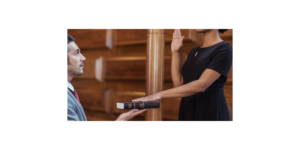Do I Have to Testify in Court? Explaining Witness Competence and Compellability

Being called to ‘give evidence’ – also known as as testify – in a criminal trial can be a daunting experience; something you may not want to do for any of several reasons – you may be worried about saying the wrong thing and thereby getting into trouble, you may have other commitments and not want to wait all day (or even several days) for your turn to come up or the person against whom you are expected to testify against may be a friend, a loved-one or even someone you fear.
Generally, only a witness who is competent (who has legal capacity) and compellable (who can be required to attend and testify) can be forced to give evidence in a criminal trial.
However, the rules regarding competence and compellability have changed over the years, generally making it harder to get out of having to testify.
Here’s a rundown of the laws that currently apply.
Presumption that all witnesses are competent and compellable
Section 12 of the Evidence Act 1995 (NSW) provides a rebuttable presumption that all persons are competent and compellable to give evidence in legal matters.
In other words, it is presumed that anyone can be compelled to testify in court unless it is established that they are not.
When is a witness not competent to give evidence?
A person will not be competent to act as a witness if they lack certain capacities due to a mental, physical or intellectual disability.
Under section 13 of the Act, a person is not competent to give evidence about a fact if, for any reason:
- the person does not have the capacity to understand a question about the fact; or
- the person does not have the capacity to give an answer that can be understood to a question about the fact.
In some circumstances, the court can make adjustments so that a person gains capacity. For example, a deaf person will have capacity to understand questions and respond if an appropriate sign language interpreter is provided.
If evidence is required to be given under oath or affirmation (sworn testimony) a person will also not be competent if they lack the capacity to understand that, in giving evidence, he or she is under an obligation to give truthful evidence.
When is a witness not compellable to give evidence?
A compellable witness is one who is required to give evidence, and failing to do so can lead to serious consequences including being charged with the offence of contempt of court.
Section 14 of the Act provides that a person will not be compellable if there are issues of competency (as described above) and the court is satisfied that:
- substantial cost or delay would be incurred in ensuring that the person would have the capacity to understand a question about the matter or to give an answer that can be understood to a question about the matter, and
- adequate evidence on that matter has been given, or will be able to be given, from one or more other persons or sources.
People in positions of governance
Section 15 of the Act makes clear that the following people are not compellable to give evidence in court:
- The Monarch (currently the King).
- The Governor-General.
- The Governor of a State.
- The Administrator of a Territory.
- A foreign sovereign or the Head of State of a foreign country.
The section additionally states that a sitting Member of Parliament is not compellable if having to to attend court would prevent the member from attending a sitting of the House, a joint sitting of parliament or a parliamentary committee meeting of which the person is a member.
Judges and jurors
Section 16 of the Act provides that a judge or juror in a proceeding is not competent to give evidence in that proceeding, but a juror is competent if being called in relation to matters affecting conduct of the proceeding.
The section further states that judge in an Australian or overseas proceeding is not compellable to give evidence about that proceeding, unless the court gives leave (permission).
Co-accused
Section 17 of the Act makes clear that an associated defendant – also known as a ‘co-accused’ – is not compellable to testify for a defendant (eg if subpoenaed to attend court by the defence) or against a defendant (eg if subpoenaed by the prosecution) in a criminal proceeding, unless the associated defendant is being tried separately from the defendant.
This rule can have important ramifications in cases where more than one person is charged with a criminal offence arising from the same alleged set of circumstances.
Family members
There are special rules that apply to the compellability of spouses or relatives in cases where their loved one is facing criminal proceedings.
Under section 18 of the Act, a spouse, de facto partner, parent or child of a defendant may object to giving evidence as a witness.
This objection must be made as soon as practicable after the person becomes aware they are required to give evidence, or that they have a right to object to doing so.
A court will accept this objection if:
- there is a likelihood that harm would or might be caused (whether directly or indirectly) to the person, or to the relationship between the person and the defendant, if the person gives the evidence, and
- the nature and extent of that harm outweighs the desirability of having the evidence given.
In determining the above, the court can consider a range of factors including:
- the nature and gravity of the offence for which the defendant is being prosecuted
- the substance and importance of any evidence that the person might give and the weight that is likely to be attached to it,
- whether any other evidence concerning the matters to which the evidence of the person would relate is reasonably available to the prosecutor,
- the nature of the relationship between the defendant and the person,
- whether, in giving the evidence, the person would have to disclose matter that was received by the person in confidence from the defendant.
Section 19 of the Act stipulates that a person cannot object if the alleged offence involves child abuse or neglect, or is related to child guardianship determinations.
So there you have it – a thumbnail sketch of the current rules when it comes to being compelled to give evidence as a witness in court.
Going to court?
If you are facing court or are unsure of your legal right, call Sydney Criminal Lawyers anytime on (02) 9261 8881 to arrange an appointment with a specialist criminal defence lawyer who will take you through your rights, your options and the best way forward.






